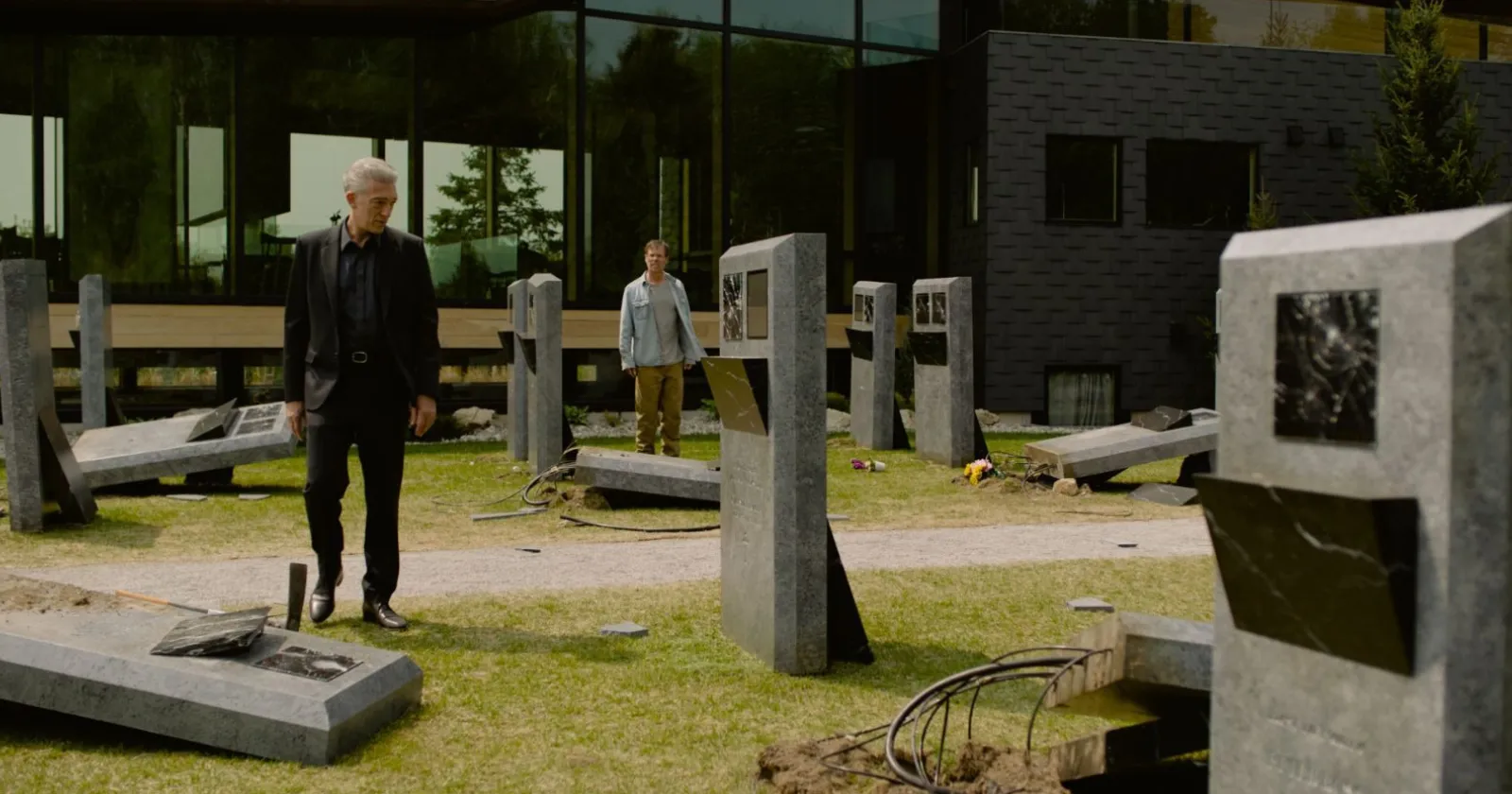David Cronenberg’s The Shrouds isn’t a genre masterpiece like The Fly or Dead Ringers, and it’s less refined than Eastern Promises. But it’s haunting in a different way. It’s the kind of film you think about more after it ends. And that might be the point. It’s a slow-burning elegy from a filmmaker who’s spent decades exploring transformation, now confronting the one transformation that awaits us all.

‘The Shrouds’ Movie Review
The Shrouds (2025) is David Cronenberg at his most vulnerable, introspective, and singular. While it’s not his most polished film, it may be among his most emotionally raw and quietly daring—a story not just about death, but about what it means to live with the image of death. Coming off a career that spans from Videodrome and The Fly to A History of Violence and Crimes of the Future, Cronenberg uses this latest film to confront the one subject he’s arguably avoided most directly until now: grief.
Following the death of his wife Carolyn in 2017, Cronenberg channels his mourning into the character of Karsh, played by Vincent Cassel in a performance that feels almost unnervingly close to the filmmaker himself. With silvery, slicked-back hair and a reserved, cerebral presence, Cassel doesn’t just play a Cronenberg character—he embodies the director’s essence. Karsh is a tech entrepreneur who, after losing his wife, develops a controversial piece of graveyard technology: a digital shroud that allows the living to view their loved ones’ decomposing bodies through a screen placed at the gravesite. The invention, both morbid and strangely beautiful, becomes a massive business venture—but also opens a floodgate of public controversy and personal anguish.
The Shrouds is Cronenberg’s continuation of a 21st-century pivot—moving away from the overt body horror of Shivers and Rabid toward more existential, character-driven dramas like Cosmopolis and Maps to the Stars. And while this movie still bears the psychological and thematic fingerprints of his earlier, more grotesque work, it’s operating on a deeper emotional register. There’s less of the literal flesh-as-terror imagery that defined his early career, but the horror here is no less present. It’s in the vulnerability of watching a loved one decompose on demand. It’s in the internal rot of unresolved grief.
When a string of graves—including Karsh’s wife’s—are mysteriously vandalized, the film morphs into a kind of tech-noir mystery, albeit a lopsided one. The plot starts to spiral with more ambition than coherence, and it’s not always easy to tell how much of the narrative’s messiness is intentional. Cronenberg is clearly less concerned with clean storytelling than with mood, concept, and personal exorcism. For some viewers, that will be frustrating. For others, it’s what makes The Shrouds feel alive.
Vincent Cassel anchors the film beautifully, but he’s joined by a strong supporting cast. Diane Kruger plays a dual role as both Karsh’s late wife and her twin sister, who shares a complicated, emotionally charged relationship with him. Their scenes together are some of the most haunting in the movie, blurring lines between past and present, intimacy and memory. Guy Pearce appears as a cynical, enigmatic tech consultant working with Karsh to uncover who is targeting his company, GraveTech. The dynamic between these three characters gives the film its narrative spine, even as the plot meanders into philosophical asides and speculative tech-world ruminations.
As with many late-period Cronenberg films, The Shrouds demands patience. It’s not sleek. It doesn’t build to a neat conclusion. But it’s a film that rewards engagement, especially for those who are familiar with the director’s trajectory. This is Cronenberg turning the camera inward, using the screen—his most familiar medium—not to shock, but to grieve.
Technically, it’s a visually elegant film, filled with eerie digital textures and stark, carefully composed imagery that evoke the sterile-yet-sacred feel of a near-future cemetery. It’s quiet in tone but loud in implication. The thematic undercurrents—our obsession with death, our desire to control it, preserve it, and eventually monetize it—are classic Cronenberg, now filtered through an unmistakably personal lens.
READ MORE MOVIE REVIEWS: G20, Night of the Zoopocalypse, Black Bag
The Shrouds isn’t a genre masterpiece like The Fly or Dead Ringers, and it’s less refined than Eastern Promises. But it’s haunting in a different way. It’s the kind of film you think about more after it ends. And that might be the point. It’s a slow-burning elegy from a filmmaker who’s spent decades exploring transformation, now confronting the one transformation that awaits us all.
Score: 7/10
The Shrouds (2025)
- Cast: Vincent Cassel, Diane Kruger, Guy Pearce, Sandrine Holt
- Director: David Cronenberg
- Genre: Drama, Science Fiction
- Runtime: 119 minutes
- Rated: R
- Release Date: April 18, 2025
- Movies Like The Shrouds: Hard Truths, C’mon C’mon, The Girl with the Needle, More Movies Like The Shrouds
